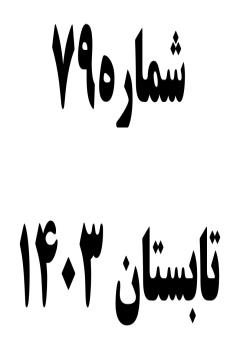Identification and Analysis of Effective Factors on the Promotion of Cultural Literacy Education of the First-Year High School Boys in Tehran
Subject Areas : Educational ScienceReza Goodarzi 1 , Kourosh Parsa Moin 2 * , soghra afkaneh 3
1 - هیات علمی واحد یادگار امام
2 - Faculty member of Rouden Azad University
3 - استادیار، گروه علوم تربیتی، واحد رودهن، دانشگاه آزاد اسالمی، رودهن،ایران.
Keywords: Cultural Literacy, Education, High School, Boys,
Abstract :
Purpose: The aim of this article was to identify and evaluate the most effective factors for enhancing the cultural awareness of male high school students in Tehran. Methodology: This study is a qualitative research. The statistical population includes 20 experts in management, who are experts in educational management, curriculum and education, primary education, and cultural management (with books or articles). The sampling method in this study was purposeful. Data were collected using semi-structured interviews using MAXQDA12 software. When the body of a society suffers from lack of culture or lack of understanding in culture, the society will be doomed, and to restore and rebuild a society and bring it out of the abyss of destruction, one should get help from education which is the best and most sensitive of them is high school grades. Findings: The results of main concepts (open codes) were obtained from 23 main concepts (basic codes), in the form of an inverse model including 6 selected codes including causal factors (4 components; 23 indicators), contextual factors (5 components; 23 indicators), strategic factors (6 components; 28 indicators), intervention factors (5 components;16 indicators), key phenomena (1 component; 8 indicators), and consequences (3 components and 13 indicators) were presented. Conclusion: Attention to cultural patterns at three levels, local, national, and international, requires special measures from educational decision-makers. In addition, with the existence of different cultural spectrums in our country and the need for national convergence and unity, the importance of this type of culture in the curriculum is more evident than ever.
اسناوندی طاهره، پارسا معین کوروش.(1400). رابطه سواد فرهنگی والدین وهویت یابی(مورد مطالعه: دانشآموزان دختر مقطع ابتدایی شهر تهران). فصلنامه ایدههای نوین روانشناسی. ۱۴۰۰; ۸(۱۲) :۱-۹.
احمدیپور, روناک, معظمی, مجتبی, طوطیان, صدیقه,کاووسی, اسماعیل.(1400). طراحی الگوی ارتقای سواد فرهنگی در آموزش و پرورش ایران. پژوهشهای آموزش و یادگیری, 18(2), 65-82.
افضلی, سعیده, صادقی, علی رضا, موسی پور, نعمت الله, قادری, مصطفی.(1401). ارزیابی ابعاد سواد چندفرهنگی دانشجومعلمان دانشگاه فرهنگیان. مطالعات آموزشی و آموزشگاهی, 11(1), 427-448.
بیرمیپور, علی, اچرش, شیدا.(1401). واکاوی مهارتهای مورد نیاز مدیران مدارس در دوران پساکرونا: یک مطالعه سنتزپژوهی. مدیریت و برنامهریزی در نظامهای آموزشی, 15(2), 145-166.
پیرانی, عارف, کاظم زاده, شادمند, نظرزاده, مسعود, مومنی, حسن.(1401). شناسایی فرصتها و چالشهای فرایند یاددهی- یادگیری در مدیریت آموزشی مناطق مرزی استان ایلام. نوآوریهای مدیریت آموزشی, 5(2), 145-167.
خاکزاد, فاروق, دهقانی, مرضیه, حکیم زاده, رضوان, صادقی, علیرضا, صالحی, کیوان.(1401). چارچوب برنامه درسی مبتنی بر توسعه سواد فرهنگی در دوره متوسطه براساس دیدگاه زایس. مدیریت و برنامهریزی در نظامهای آموزشی, 15(1), 173-192.
حيدري، علياکبر(1396)، ارزشیابی اثربخشی دورههای آموزش ضمن خدمت Icdl کارکنان جهاد کشاورزي شهرستان نيشابور بر اساس مدل کرک پاتریک. پاياننامه کارشناسي ارشد، دانشگاه علامه طباطبايي
ظفرمند, آزاده, مهرام, بهروز, نوغانی دخت بهمنی, محسن.(1401). برنامة درسی پنهان و رفتار مبتنی بر اقتصاد مقاومتی دانشآموزان(مورد: یک دبستان دخترانه). مطالعات آموزشی و آموزشگاهی, 11(1), 223-253.
مرتضی, ارسلان, طالبی, بهنام, ادیب, یوسف.(1401). طراحی و اعتبار یابی پرسشنامه برنامه درسی پنهان دانشجویان دانشگاه علوم پزشکی ارومیه. مجله توسعه آموزش جندی شاپور اهواز, 13(1), 74-85. doi: 10.22118/edc.2021.275117.1732.
محقق, فاطمه, امام جمعه, فرهاد, موسویان, سید مرتضی, درمان, فائزه.(1399). رویکرد فعال و کاربردی به سواد فرهنگی دانشجویان، بازآفرینی ادراک فرهنگی. فصلنامه علمی مطالعات میان فرهنگی, 15(42), 87-116.
ملکی پور, احمد, حکیم زاده, رضوان.(1395). تبیین برنامه درسی چند فرهنگی با تاکید بر شناسایی مولفههای هویت بین المللی، ملی و بومی برنامه درسی. پژوهشهای کیفی در برنامه درسی, 1(4), 41-55. doi: 10.22054/qric.2016.7492
ملکی، حمید.(1398). مبانی برنامهریزی درسی آموزش متوسطه. تهران: نشر سمت.1-176.
Cook, V., Maine, F., Fozzard, L., & McCaughran, B.(2023). Building cultural literacy through dialogue: Democracy at the heart of learning. In Unleashing Children's Voices in New Democratic Primary Education(pp. 145-159). Routledge.
Dini, J. P. A. U.(2022). Building a Literacy Culture Based on Local Wisdom through Women's Leadership. Jurnal Obsesi: Jurnal Pendidikan Anak Usia Dini, 6(4), 2533-2543.
Heriyawati, Y., & Wita, A.(2022). Exploring the Indonesian Maritime Art toward Appreciation of Coastal Literacy. Harmonia: Journal of Arts Research and Education, 22(2), 283-297.
Lähdesmäki, T., Baranova, J., Ylönen, S. C., Koistinen, A. K., Mäkinen, K., Juškiene, V., & Zaleskiene, I.(2022). Learning cultural literacy through creative practices in schools: cultural and multimodal approaches to meaning-making(p. 151). Springer Nature.
Mendez Cota, G., & Lopez Cuenca, A.(2020). Beyond rebellion of the net: Infrastructural commoning as critical cultural literacy. Critical Arts, 34(5), 24-38.
pratiwi, k. k., suhadjo, s., wibowo, b., & lutviatiani, m.(2023). implementation of multi-literacy education based on cultural literacy with the tandur strategy in community learning center(clc). aksara: jurnal ilmu pendidikan nonformal, 9(1), 159-176.
Robinson, P. A., & Williams, K. V.(2023). Exploring the Development of Racial and Cultural Literacy Skills in the Classroom: Strategies to Support Diverse Student Populations. In Handbook of Research on Race, Culture, and Student Achievement(pp. 103-119). IGI Global.
Shliakhovchuk, E.(2021). After cultural literacy: New models of intercultural competency for life and work in a VUCA world. Educational Review, 73(2), 229-250. doi:http://dx.doi.org/10.1080/00131911.2019.1566211
Uleanya, C.(2022). Hidden curriculum versus transition from onsite to online: A review following Covid19 pandemic outbreak. Cogent Education, 9(1), 2090102.
wei, jingzhu, & li, shuainan.(2020). are they efficient? an evaluation of cloud-based cultural service platforms with data envelopment analysis. iconference 2020 proceedings.

